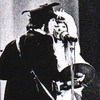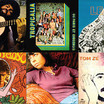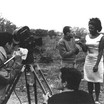Ilumencarnados seres

gal costa
Interviews
Ana de Oliveira – How did you get the roles of “great singer and inspiring muse” of the Tropicalista group?
Gal Costa – I can say that I was Caetano’s inspiring muse because he composed for me like any other composer. He speaks as if he were speaking to me. I met Caetano and Gil in Salvador and joined them, Maria Bethânia, Piti, Tom Zé, and we inaugurated the theatre Teatro Vila Velha.
Ana de Oliveira – Did you think about the transformation and assimilation of Janis Joplin’s singing style?
Gal Costa – I was very much in love with what she was doing. I wanted to grasp that language. My debut was at a festival on TV Record performing the song “Divino Maravilhoso,” by Caetano and Gil. Gil, who arranged it, asked me how I wanted to sing it. I answered: “As extroverted as I have never sung.” Then I went on stage with that “black power” hair and those irreverent clothes… Half the audience booed, half applauded. It was something entirely new to me.
Ana de Oliveira – How was the experience of suddenly representing the Tropicalista group when Caetano and Gil went on exile?
Gal Costa – I represented them both. People connected me to Caetano specially. I often went to London, and I would sing here the songs they composed there. Dictatorship didn’t castrate Tropicalismo mainly because I stayed here.
Ana de Oliveira – Do you consider your performance of “Divino Maravilhoso” as your big stylistic turning point?
Gal Costa – Yes, because until then I was very influenced by João Gilberto only. It was him who gave me a modern view of music. He is my master.
Ana de Oliveira – And why did you, who were so influenced by João Gilberto, change like that?
Gal Costa – Because of Tropicalismo. It was more than natural that I reacted like that, even being Bossa Nova’s daughter. When Tropicalismo came up, the Bossa Nova people did not understand it. But I have always been open to new languages.
Ana de Oliveira – And how about the aggressive reactions of your colleagues who were against the Tropicalista movement?
Gal Costa – That happened on the behalf of people connected to Bossa Nova. I was very certain of what I was doing. I knew I was not violating Brazilian music. It was a moment the world was going through. Searching new concepts, through Sex or through drugs…
Ana de Oliveira – Today, what does having been a Tropicalista mean to you?
Gal Costa – A fantastic spiritual experience. I have learnt to deal with polemic, with the other. I have learnt to be exposed, to accept criticism.





















